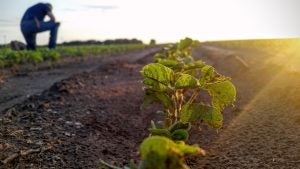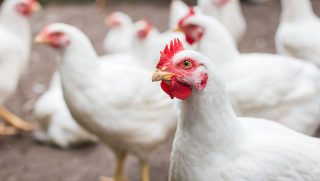“Farmers and ranchers are caretakers. They take care of their equipment, they take care of their animals, they take care of their land, but they don’t always take care of themselves,” said Adrienne DeSutter, agriculture wellness and behavioral health consultant. That care can come in the form of rest, regular meals or having conversations about struggles or stress, explained DeSutter who serves as a consultant with Acceleron, a portfolio subsidiary of Bayer.
Acceleron recently started focusing more on taking care of the caretakers with a mental health initiative, #FarmStateofMind. A.J. Hohmann, the U.S. marketing manager for Bayer, states the primary goal of this initiative is to remind farmers and ranchers they are not alone in the struggles of agriculture.
“This year has been record-setting for all the wrong reasons,” Hohmann said. “So we [Acceleron] wanted to expand from creating just product solutions to other solutions that farmers, farmer’s families and the ag community, in general, could take advantage of and that would bring more awareness to mental health and mental wellbeing.”
Taking care of ourselves physically as well as mentally is key because “without a farmer, there is no farm,” DeSutter said.
The biggest priorities in times of stress are to take care of your basic needs — sleeping and eating. In agriculture that can be difficult because of the uncontrollable nature of our work, but sometimes it is necessary to take a break before finishing. “Clear your mind and remember there are more important things out there than how well a certain field yields or how many acres get planted in a day,” Hohmann said.
Farmers and ranchers tend to be independent, which can make reaching out and asking for help difficult.
“We can’t be afraid to reach out. When we know our animals need help — antibiotics, vaccinations, extra care — we are quick to get that for them. We have to have that same respect for ourselves,” DeSutter said.
Whether that help comes in forms of working around the farm or being willing to listen, it can drastically decrease stress. DeSutter suggests talking to someone, anyone you trust, about what you’re struggling with. That person can be a pastor, a spouse, a family member, or a friend. As long as it is someone who will listen and remind you that you are not alone.
Reversely if you think someone might be experiencing higher stress than normal or depression, it is important to reach out and check in with them.
“If you saw someone struggling in water or choking, you would not think twice about jumping in to help,” DeSutter said. “We need to know those signs of stress and be comfortable jumping in to help.”

Those signs of stress or depression can come in many forms, with the biggest being a change in normal behavior. That can manifest itself in eating more or less, getting sick more often, sleeping more or less or being irritable. Other common signs are drawing away from interests, being apathetic about one’s appearance or the appearance of the farm. The biggest takeaway is to look for changes in habits because it can point to bigger issues.
There are specific warning signs for serious depression or suicide as well. They can include withdrawal, expressing feelings of worthlessness or seeming like a burden to others. Phrases might revolve around feeling trapped, hopeless or that there is nothing to live for. One of the final signs is giving away prized possessions. While these signs are helpful, they are not always conclusive.
“The reality is there is no magic formula for stress, depression or suicide. Everyone’s cup is a different size and holds different things,” said DeSutter. “We can’t know when someone’s cup is going to overflow. Pay attention, be educated on signs and symptoms and don’t be afraid to reach out if you’re worried about someone.”
That is the goal of #FarmStateofMind — to educate people about the signs and symptoms of stress, anxiety, depression and suicide and to help people become more comfortable having conversations about these topics — whether in person or online. More information about signs, next steps and additional resources can be found in the Acceleron resource library.
One of the integral ways to address this crisis is to ensure that people realize they are not alone. Hohmann encourages people to use the hashtag and share your story or at least read other’s stories. “Look out for each other, at the end of the day, we’re all in the industry together, going through a lot of the same issues. Let’s make sure that we’re there for each other when needed,” Hohmann said.
Every job has stressors, but agriculture has a combination of unique challenges that truly set it and its employees apart.
“Farmers are living a career that is also a lifestyle; there is not much separation between going to work and coming home,” DeSutter said. That lack of separation can lead to heightened rates of stress, anxiety and depression. Recognizing the signs and symptoms in yourself and others is an important part of addressing these issues.
It can seem dramatic or daunting to reach out and ask the hard questions, but it is truly crucial to our survival as agriculturalists. “This is life or death sometimes,” explained DeSutter. “Would you rather put yourself in an awkward position that shows you care, or would you rather be reading their obituary? It’s up to you.”
Michelle Bufkin is a freelance communication specialist whose goal is to help producers bridge the farm-to-plate knowledge gap that exists with consumers today. She uses her full-time position as the Membership and Communication Director at the Arkansas Cattlemen’s Association to interact with producers and work on building that connection.



